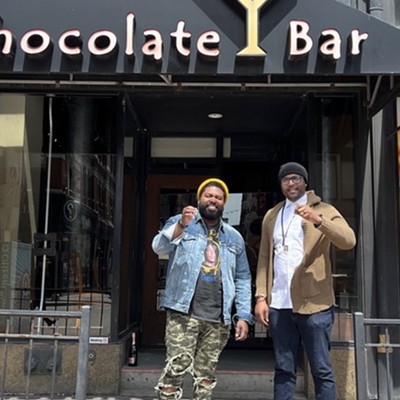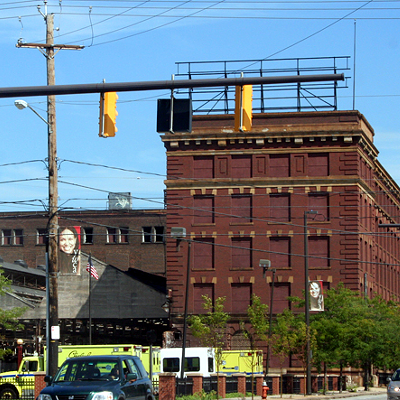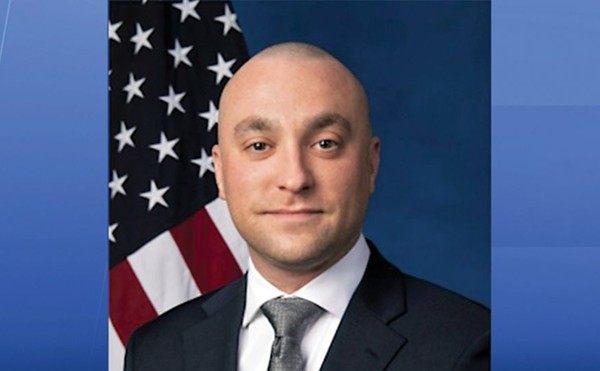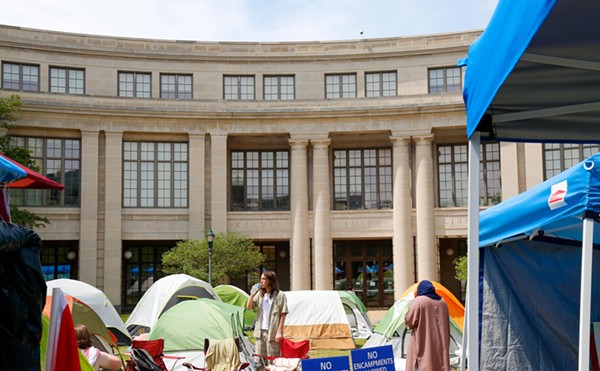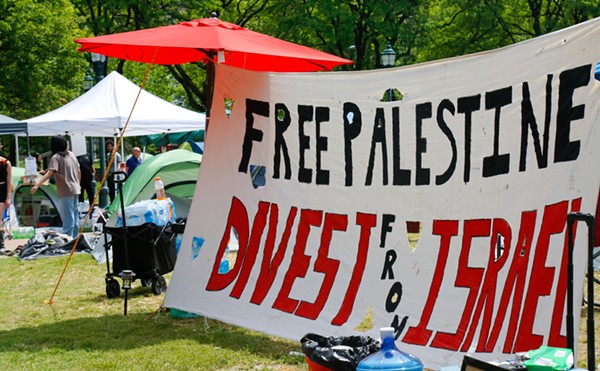For obvious reasons, September 11 was anything but typical. As word circulated that an airplane had slammed into the World Trade Center, a somber hush fell over the 40-odd workers in the warehouse-like room. When the second plane hit 18 minutes later, nervous speculation supplanted stunned silence.
As federal employees, would they be targets? Carriers lingered near radios and the break-room television, but within a few hours, they pulled themselves away and walked to their mail trucks. Neither rain nor snow nor terrorist would keep them from their appointed rounds.
The next day, their anxiety proved well-founded. Letter carrier Nicholas Foradis was attacked while delivering mail on East 108th Street. The beating was as unrelenting as it was savage. The assailant, Ray Dyer, punched, choked, and sprayed Foradis with mace for 15 minutes.
That the attack happened September 12 was not happenstance. Dyer had smoked PCP and seems to have suffered delusions fueled by news coverage of the terrorist attacks. Court documents theorize that Dyer may have initially mistook Foradis -- of Greek descent, with dark skin and a bushy mustache -- for an Arab.
But it's another racial issue that vexes Foradis. During the beating, dozens of residents gathered to watch, some even brandishing weapons. But none came to his aid. One man even laughed as he gave a play-by-play to someone on his cell phone. This on the day when Americans of all colors were supposed to band together against a common foe.
"The route I delivered is in an all-black neighborhood, and no one tried to help me or even call the police," Foradis later said. "A dog being beaten on the street that day may have received more respect or pity than I did."
Mary Jackson was lying in her bed on the evening of September 11 when the phone rang. It was her son, 21-year-old Ray Dyer, whom she hadn't seen in days.
"The world's coming to an end!" he said.
"Where are you?" she asked, but he hung up without telling her.
She had reason to be concerned. For the past several days, Dyer had been staying out all night, stopping home just long enough to wolf down a bowl of cereal. "He wasn't sleeping," she says. "He wasn't looking like himself to me."
Jackson suspected he was on drugs. Whenever she confronted him, he brushed her aside. "Mom, I'm fine," he said. "You worry too much."
In truth, Dyer had been doing dope since he was a child. He tried marijuana at age 11 and was soon smoking up to 15 joints a day, he confessed during a psychological evaluation. "It was a way to escape, I guess," he says.
An ill relative provided a chance at redemption. At age 17, Dyer moved to Indiana to care for his grandmother, who was sick with lupus. He met a woman, fathered a child, and got his GED.
But if he hoped for a fresh start, he soon learned his habits would be harder to change than the scenery. He was arrested twice for battery -- once for slapping an ex-girlfriend, a second time for punching a guy. He also consumed a daily diet of drugs, only now he had moved to the hard stuff: cocaine and wet -- cigarettes or joints dipped in PCP.
Aware of her son's legal trouble, Jackson convinced him to move back to Cleveland, where he again tried to right his life. He worked menial jobs at Starbucks and a shoe store, and enrolled in Remington College to study computer networking.
But his new life imploded at the end of August, when he lost his financial aid and couldn't afford the $200-a-month tuition. "I didn't have nobody to talk to about it," Dyer says. "One thing led to another, and I was back out on the streets again."
September 11 didn't help Dyer's mental state. A day earlier, he had offhandedly mentioned that it was only a matter of time before someone bombed America. Now that seemed like prophecy. Under the influence of PCP, Dyer imagined himself a terrorist target.
"I thought they were trying to kill me because I knew too much," he says.
He hid in a friend's house. At 4 a.m. on September 12, they went to buy PCP. Suddenly, Dyer pulled a knife, "What are you doing?" he snapped at his friend. "Are you setting me up?"
His friend calmed him down, but Dyer's paranoia resurfaced later that afternoon. For no apparent reason, Dyer jumped on his mountain bike, which had a flat tire, and began pedaling down the street like a low-rent Paul Revere. "We at war! We at war!" he yelled.
When he reached East 108th Street, he tried to steal a car, but couldn't get it started. That's when he spotted 48-year-old Foradis, sitting in his postal truck.
A voice in Dyer's head told him Foradis had a bomb and was trying to kill him, Dyer confessed the next day. So he went on the attack. He bludgeoned Foradis, sprayed him with pepper spray, and tried to steal a crucifix from around his neck.
"The war is on!" Dyer yelled during the assault, according to court records. "It's either you or me. I'm going to kill you!" Witnesses heard him talk of "payback." At one point, he held up his arms in triumph and shouted, "We won! We won!"
Dyer later expressed remorse and blamed a drug-blinded form of patriotism. "I wish I had known the truth that day," he said. "I feel bad. I really do. I just want [Foradis] to forgive me. I thought I was helping and defending the United States."
But Steven Jackson, the assistant U.S. attorney who prosecuted Dyer, doesn't buy his claims of September 11-induced hysteria. "Our position was that he intended to rob Foradis or the U.S. Mail," Jackson says. "It has nothing to do with September 11. That was a convenient story for him to latch onto."
Around the post office, Foradis was known as a devout Christian. Two or three times a week, he and co-worker Ray Smith discussed religion, often during their morning vehicle check. "We talked about a strong belief in God, and that he always believes that God has his way," Smith says. "You may not understand it, but God has his way."
Foradis loved his job. "I can't believe the post office pays me to take a brisk walk," he was fond of saying. He worked as a "leave regular," filling in for carriers who were sick or on vacation. He enjoyed the freedom of not being tethered to the same route.
Foradis declined an interview request. "He really doesn't want to talk about it," says Postal Inspector John Campisi. "He's still very disturbed by this incident." But a 12-page statement Foradis read in court provides a vivid account of what happened to him September 12.
That day, he was assigned to deliver to East 108th Street. He had worked the route before and knew some of the residents. Ellawease McLeod, a woman with traces of white hair in her tight braids, says her grandchildren sometimes scampered out to greet Foradis and follow him on his rounds. "He was very nice," McLeod says.
Foradis parked his truck in the middle of the block, several houses down from McLeod's. He delivered some of the street's mail and was reloading his bag when Dyer, a medium-sized man with unruly hair and a wispy mustache, made a beeline for the truck.
Foradis assumed Dyer had mail to be delivered. Instead, Dyer delivered a fist to his jaw and followed with several jabs that knocked Foradis to the floor of his truck.
Dyer rained punches on Foradis's prone body. He snatched away Foradis's mace and sprayed him with so much that Foradis thought he would drown. Then Dyer used the metal can to hammer away at Foradis's face, head, and chest.
One resident heard the commotion and ran into the street. "Help!" she yelled. "Somebody help! He's beating him!" She says she ran into the house and called 911. But according to an incident report, police didn't receive the first emergency call until 2:01 p.m. -- 21 minutes after the attack started.
Joe Deal and Mike Craig, two brawny young men from the end of the block, heard the cries and thought someone was attacking their regular mail carrier, who was six months pregnant. They came running. What they found was a bloodbath.
"The mailman looked deformed," Deal says. "His whole face was swollen. He got blood all over him."
Craig says he was about to grab Dyer when Deal stopped him. "I wasn't trying to grab homeboy while he was bleeding," says Deal, whose mother works in a nursing home and warned him about bloodborne disease.
Soon dozens of residents gathered to watch the assault. One resident recalls a man on a cell phone laughing as he described the scene. "He's wooed out!" the man said of Dyer. "Kicking the mailman's ass!"
Carrie Lucas, a 63-year-old crossing guard, grabbed a solid wooden rod her children once used to play stickball. Several other people carried shovels and other weapons. "We all went out with sticks and bats to beat the guy up, 'cause that was our mailman," Lucas says.
She didn't arrive in time to help. But other neighbors -- some young, some old -- watched from both sides of the street. Some yelled, "Get off of him! Leave him alone!" They clearly had Dyer outnumbered. Yet none seemed willing to make the first move. "Nobody even tried to help him," says Lucas.
The mail truck rocked as Dyer continued to pound Foradis. The blows fractured Foradis's jaw and chipped several of his teeth. Some of the fluid squished out of his left eye, which began to blacken and swell shut. Foradis lost consciousness, only to awaken and find the assault continuing unabated.
"Where's the keys, man? Where's the keys?" Dyer yelled.
Foradis mustered his remaining strength and said, "Take the keys, take the truck, just let me go!"
"I'll let you go, white boy," Dyer allegedly said. "After I kill you."
It's unclear whether Foradis misheard or if Dyer had realized his victim was white. Dyer, who has many white friends and whose son is half-white, says he wouldn't have called Foradis "white boy." Several witnesses say they didn't hear any reference to "white boy."
Whatever Dyer said, it convinced Foradis he was fighting for his life. Instead of just blocking blows, he started to punch back. Then Dyer got careless and left his hand near Foradis's mouth.
Foradis bit hard on the webbing of Dyer's thumb. Dyer screamed and smashed Foradis in the face with the mace can, but Foradis held fast. He wrested back control of the mace and sprayed Dyer in the face, then gave him a two-legged kick out of the truck. Foradis sprayed him with another dose of mace. Dyer fled.
After 15 brutal minutes, the attack was over. Foradis was awash in blood and holding his eyeball in place, which was swollen to the size of a golf ball. He was unprepared for what happened next.
"I looked to the left and right, screaming for someone to please help me," Foradis said in his court statement. "As I ran towards people for help, they started backing away, and I did that three or four times. No one came forward, and I saw in the groups of people smiles, and in others I heard laughter."
He ran to McLeod's house and banged on the door. A young woman answered. Foradis heard an older voice inside yell, "You open the door and let him in. That's the mailman!"
McLeod and her family soaked towels in cold water and tended to Foradis's wounds. She also called the police and the post office. "I told them to hurry up and get out here, 'cause he was bleeding pretty bad."
Even as he bled, Foradis's thoughts were on his mail duties. When police arrived, he made sure to secure his truck. Then he went to a waiting ambulance.
"Though dazed, bloody, and wobbly, I defiantly shook off the two police officers who were holding me on each side and walked to the ambulance by myself," Foradis said in court, "because I didn't want to give those who smiled and laughed the satisfaction of seeing me leave the scene on a stretcher."
The damage to Foradis was severe. His fractured jaw clicks and pops, and within two years may degenerate so much that his mouth locks shut. He endured six root canals, but still needs implants, bridges, or false teeth. He lost peripheral vision in his left eye and suffers from hearing loss in his left ear, which bled for months.
Worse, a broken bone in his wrist prevents him from delivering mail again. "Your mailman days are over, young man," a doctor told him.
But some of the deepest scars are psychological. For three years, Foradis served on the Board of Directors of the Massillon Urban League. Dyer's attack and the inaction of black neighbors left him jaded. "I now have an intense distrust, anger, and fear towards all black people," he said in his court statement. "I never had any racial feelings like that before."
East 108th Street doesn't suggest menace. There are no bars on windows, few fences to protect yards. Lawns are kept well trimmed, streets are swept. One of the top complaints among elderly residents is a roving game of tag that tramples their yards. As one residents puts it: "We live in the inner city, but we love one another."
At 65, Alberta Moore has become something of a grandmother to the neighborhood. In her 29 years here, she's helped raise generations. "If the children are out here playing, I'll be watching them," she says. "We always try to look out for one another."
On a recent summer day, Moore sits on her porch kibitzing with neighbors. They talk about a baby born to a woman who already has too many. They laugh about a neighbor who locked herself out of her house. And they wonder why their neighbors didn't do more for Foradis.
Genetta Alexander, 65, says she confronted a young man who watched the assault from his porch. "I said, 'Why didn't you do something? Why would you just sit there?' He didn't answer."
To Lucas, it was all the worse because it happened on September 12, when Americans were proudly displaying their unity by rushing out to buy flags. "A lot of people were saying it's time for people to come together now and stop all the bullshit," says Lucas. "But people are still the same, before and after. A lot of people never changed."
One man did try to help. Lucas's son, Michael Roundtree, has thick arms and an instinct for heroics. Several years ago, he heard a scream and saw a neighbor run out of her house. She said she had been raped. Roundtree chased down her assailant and held him until police arrived. Another time, Roundtree saved a man passed out from dehydration.
So when Roundtree heard the scuffle up the street, he ran into his house and threw on his tennis shoes. Unfortunately, by the time he arrived at the scene, Dyer had taken off. "He looked up and seen me coming," Roundtree says. Roundtree gave chase, but lost Dyer when he cut through a neighbor's yard.
Roundtree was disappointed no one else tried to help. "They weren't doing nothing but screaming and hollering," Roundtree says. "I was like 'Shit, y'all gonna stand there while he beats the man to death?'"
Yet, like most of the neighbors, he thinks Foradis's race had nothing to do with how neighbors reacted. "Them niggas was scared," he says of the young men in the crowd.
It wouldn't be the first time a crowd failed to foil a crime. In 1964, Kitty Genovese was murdered in a densely populated New York neighborhood. Some 38 neighbors heard her cries for help, but did nothing for 35 minutes as she was stalked and stabbed to death. The case became a symbol of people's unwillingness to help a stranger in need.
Craig and Deal, the two young men who came running when they heard screams, say they would have helped Foradis if it weren't for the carnage. "The blood was the deal breaker," says Deal, a 28-year-old maintenance technician. "It's hard to help somebody when you don't know if that person is clean or not."
Indeed, Foradis claimed in court that he contracted hepatitis C and herpes from biting Dyer's thumb. "I'd been married for barely six months when the attack took place, and now for the rest of my life, I'm going to have to use a condom so as not to infect my wife," Foradis said. "I will be reminded of that savage beating and the result of that beating every time I go to bed with my wife."
Doctors say that mode of transmission would be highly unlikely. Yet even a slim chance of infection is enough for Deal to justify his inaction. "How do you expect us to help you?" he says, as if talking to Foradis. "We're scared of the same thing that happened to you. All three of us could have hepatitis and herpes."
It's nothing personal, Deal says. "If it would have been the mailwoman, I wouldn't have helped her either, not if I seen all that blood."
He criticizes the laughing man on the cell phone for not hanging up and calling police. "I asked him why he didn't call somebody, and he said he didn't want to get involved."
But Deal refuses to feel guilty. "What is it my business?" he asks. "Am I supposed to be a hero? I don't have no 'S' on my chest . . . What kind of hero would I have been if I helped the man and caught a disease? What kind of hero would I have been to my family?"
And if it had been a member of his family being beaten while a crowd did nothing? "Of course I would be angry," Deal says. "But I would have to see their point of view. Just to do a good deed, is it worth risking your health? I feel bad that it happened, but you can't expect people to be heroes just 'cause you're in trouble. That's the police's job."
That explanation doesn't wash with McLeod, who took in Foradis and helped clean him up. "I'm a Christian," she says. "And I can't just stand by and watch an innocent get hurt for nothing."
When she's informed of Foradis's claims about catching herpes and hepatitis C, McCleod clutches her heart. Her breath catches in her throat. "I have grandkids that are around me all day long," she says. "This is not a good thing to find out."
Seconds later, her face brightens and she breathes relief. She just remembered she had a blood test last month for her life insurance. "Thank you, Lord! I tested clear of everything," she says.
Yet the momentary scare gives her a new outlook. "Now I know why people think twice before they help."
On September 12, Mary Jackson was talking to her sister-in-law when she saw her son, Ray Dyer, come running up the street. "He looked like he was spaced out of his messy mind," she says. "I took one look at him and said, 'I'm going to take you to the hospital.'"
Police had warned emergency rooms to be on the lookout for a man of Dyer's description with a thumb wound. When Dyer checked into Meridia South Pointe Hospital, he was arrested.
The next day, he admitted to the assault. He later pleaded guilty to robbing the U.S. Postal Service and causing serious bodily injury to a letter carrier.
On June 11, Dyer appeared before Judge Donald Nugent. He would be given 10 years and 10 months, but before the penalty was handed down, Foradis addressed the court.
"I ask his honor and anyone in the court to think now about the next 15 minutes," Foradis said. "Think about how long 15 minutes is and how slowly it passes. Think about being surgically and methodically beaten without a pause for 15 minutes. That's how long the defendant beat me in my mail truck."
Foradis's statement was as much an indictment of East 108th Street as it was Dyer. "Anyone on that street that day could be someone I meet on the bus, a shopping center, or gas station, or for that matter anywhere," he said. "Yet no one cared or bothered to help me."
Michael Roundtree, the man who chased Dyer, was happy to hear Foradis was OK. He wanted to visit Foradis in the hospital, but wasn't allowed, he says. "I was going to go to the hospital and tell the man, I'm sorry I wasn't quick enough to help you."

